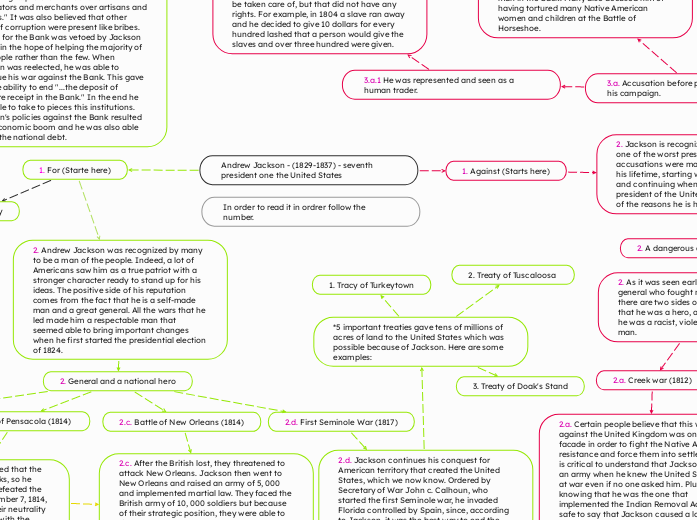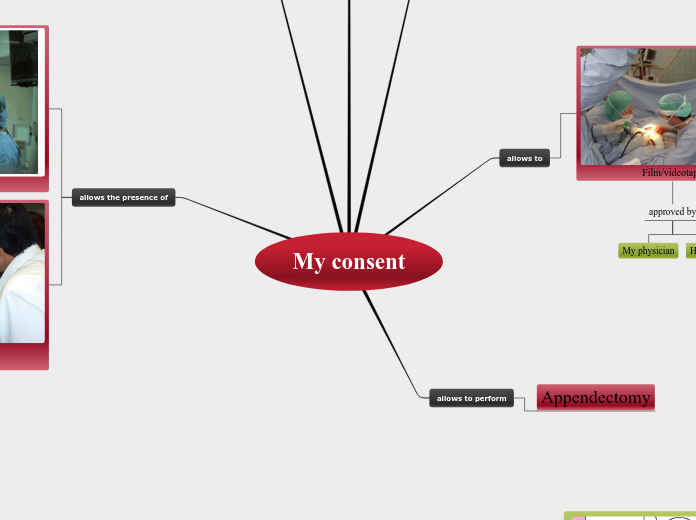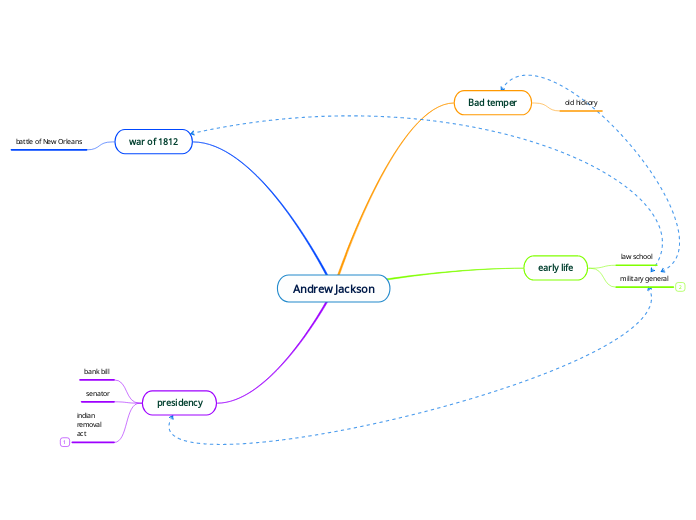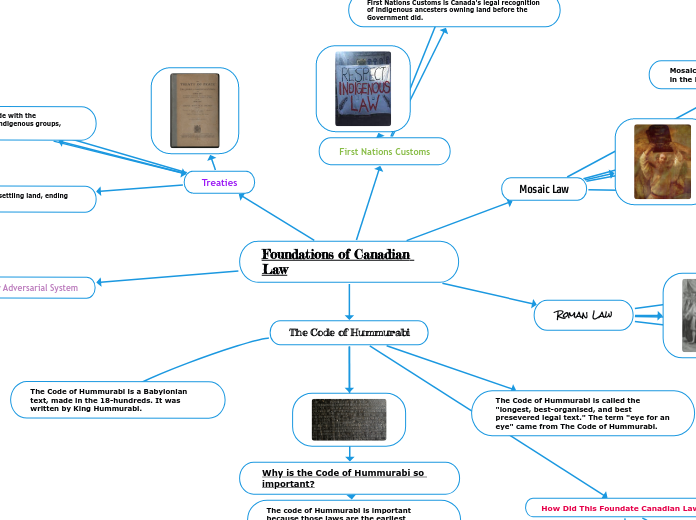67. He censured Louis Louaillier and made him arrested because he criticized the fact that he was keeping Martial Law.
68. A judge named Dominic A. Hall signed a paper saying that the imprisonment of Louaillier imprisonment was illegal. Yet, Jackson made Hall’s arrest, and he kept Louaillier imprisoned. Later banished Hall.
48. The Bank
49. In 1829 Jackson accused the Bank of being corrupted and disadvantageous to the Americans. He believed that this place was only an establishment that was profitable for the rich in order for them to get richer on the back of honest people.
50. Many argued that it was giving "...preferential loans to speculators and merchants over artisans and farmers." It was also believed that other types of corruption, like brides, were present.
51. The Bill for the Bank was vetoed by Jackson in 1832 in the hope of helping the majority of the people rather than the few.
52. When Jackson was reelected, he was able to continue his war against the Bank.
53. This gave him the ability to end "...the deposit of Treasure receipt in the Bank." In the end he was able to take to pieces this institutions.
54. Jackson's policies against the Bank resulted in having the country recover its normal economy and he was also able to pay the national debt. This resulted in an economic boom.
In order to read it in ordrer follow the number.
85. Tenure of Office Act
86. As it was seen earlier, Jackson put in place this act in order to authorize himself to make rations in the office. However, many accused him of having done that just to put in place loyal democrats.
87. On the other hand, some argue that it was the rest of the party that insisted on giving posts to loyal democrats and not him.
88. Indian Removal Act
89. This act gave Jackson the ability to discuss with Native Americans and make treaties with them in order to take their lands. Many accused him of having encouraged a genocide towards Native American.
90. Some argue that these lands were bought in a proper and human way. That it was made to their benefit, since white settlers wanted to exterminate them. Some say that Jackson truly believes that it was better for Native Americans to move west.
91. However, most people agree upon the fact that these treaties contained bribes, fraud, intimidation and threats. Indeed, the U.S. Army was way larger than the soldiers in the different tribes and so they did not have much choice than to listen and move from their lands. Plus, when the Act was in place many people of the Supreme Court and Congress oppose it.
92. Here are some of the treaties that Jackson made that are seen as controversial. In Total Jackson moved 70, 000 people, which at the same time killed many Native Americans because of unsanitary conditions, epidemics, and their resistance.
6. The removal policy in the Northwest
This led to a war between tribes which ended in Native Americans, having even fewer lands.
5. (93). Treaty of New Echota in 1836
94. For more information to see:
4. Creek War of 1836
To that point the government wanted the people to leave their original land willing, yet in 1836 they forced them. This ended up most with Creek being removed from the Oklahoma Territory.
3. Treaty of Cusseta in 1832
Technically, their land should have been protected and the government should not have the right to take it, but they did not follow this and took it anyway.
2. Treaty of Payne's Landing in 1832
It stated that the Seminoles would move west if they were able to locate lands that were suitable and they would also be included in the Muskogee Creek Confederacy.
Most of them did not want, which led to the Second Seminole War in 1815.
1. Treaty of Dancing Rabbit Creek in 1830
Most people in that tribe did not want to move but were forced to.
95. Jackson even signed treaties with people of different tribes that were not even the official leaders.
96. For example, he signed a treaty with the Cherokees named the Treaty of New Echota in 1836 with a member of that group that was not even a leader.
97. These people were then forced to leave by the army and march the trail of tears even if they were not prepared. Indeed, they did not have time to gather enough provisions before they left.
98. Some people would argue that he did not really force them to leave, since he only ratified the document, and that it was Buren who executed it.
99. Yet, at the same time, everything was in place so Buren just had to execute it.
Andrew Jackson - (1829-1837) - seventh president one the United States
55. Against
56. Jackson is recognized by many as being one of the worst presidents. Many accusations were made against him during his lifetime, starting when he was a general and continuing when he became the seventh president of the United States. Here are some of the reasons he is hated:
77. The Precendency
83. When Jackson was elected h let drunk people entered the white house and it took weeks to be able to restored it to the way it was after they came.
84. However, some argue that it was the American people celebrating their victories.
124. Slavery
125. During the 1830s many people wanted to end slavery.
126. In 1835 the American Anti-Slavery Society sent different handouts to the south by mail.
127. As it was seen, Jackson was pro-slavery, and so he declared that the people fighting to end slavery were monsters that should die.
128. This provoked rebellions in Charleston.
129. In support to the south people, Jackson ordered that the names of the people that sent the handout anti-slavery were shown so that retribution could be done onto them.
130. He later, with the help of the Congress, prohibited the publication of anti-slavery propaganda because that instated people and slaves to create riots.
122. Promises not hold
123. During his inauguration he swore to respect the boundaries of executive power. Yet, with his economic implications and others, many started to call him "King Andrew the First," because he had a lot of power, which made him appear to be a monarch that does ask people what they believe.
109. The Bank
110. As it was seen, Jackson, during his presidency, made a reformation of the Bank in the United States.
111. However, even if it created an economic boom, it also caused the Panic of 1837.
112. Because Jackson decided that the federal money should go to state banks, the western Banks were more negligible on their standard for loan admission.
113. Plus, because of the Indian Removal Act, many territories were now available for purchase.
114. Two thing than lead to the crisis of 1837
(118). 2. Deposite and Distributions Act
119. The goal there was to send the federal money from the eastern banks to the western bank.
120. This caused the eastern bank to not be able to pay their debt to the British.
(115) 1. Species Circular
116. This forced people to buy western land only using coins.
117. At first the goal was to make the economy more stable by lowering credit speculation. The problem is that the United States Reserve of gold and silver were not able to follow the demands.
121. This led the U.S. in an economic depression that finished in 1841.
100. Nullifications
101. The Tarif of 1828 put in place by John Quincy Adams was not appreciated and because of that John C. Calhoun declared that the state should not be imposed on them any Tarif and that they should be able to decline it.
102. When Jackson became president, he declared that Congress should have the right to impose Tarif. This was important for him, because it would make him respect the promise he made of fixing the national debt.
103. In 1832 Jackson revised the Tarif, yet he did not satisfy any camp, between the one that was for it and the one against it.
104. On November 24, South Carolina said that they would not respect any of the two Tarif.
105. This angered Jackson and he publicly stood against the people for nullification. He even said that the people for it would be hung, accusing South Carolina of being on the path of rebellions.
106. Later he tried to put in place a "Force Bill" in order to be able to force South Carolina to respect the bill by military force.
107. Some would argue that later in 1833 they were able to find a compromise.
108. Yet, again the way to achieve this was on a very violent path.
78. Accusation before precedency or during his campaign.
82. Jackson was also accused of adultery. Indeed, him and his wife, Rachel, started living together before the marriage of Rachel was completely ended by a divorce.
81. He was also seen as a murderer who killed 18 white men, different soldiers because they left the amrny without authorization and even to have stabbed a man in the back. Many also accused him of having tortured many Native American women and children at the Battle of Horseshoe.
79. He was represented and seen as a slave trader.
80. Indeed, Jackson was a southern American that by 1804 had nine slaves, 1820 close to 100, and by 1845 over 150. He had in total more than 300 slaves. Jackson was inclined for slavery. He saw these humans being as machines that needed to be taken care of, but that did not have any rights. For example, in 1804 a slave ran away and he decided to give 10 dollars for every hundred lashed that a person would give the slaves and over three hundred were given.
57. A dangerous and racist general.
58. As it was seen earlier, Jackson was a general who fought many battles. However, there are two sides of that coin. Some believe that he was a hero, and others believe that he was a racist, violent and irresponsible man.
69. First Seminole War (1817)
70. After the precedent war, Jackson continued his battle against Native Americans.
72. Prospect Bluff also called "the Negro fort."
76. When the First Seminole War started and that Jackson had fort St. Marks and Pensacola, he also imprisoned two Brish, Robert Ambrister and Alexander Arbuthnot, which he later killed. This caused turmoil with the British.
73. Jackson wanted to have Florida in his carreer and again he was willing to break morals in order to satisfy his political envy.
74. According to him this fort was dangerous for the United States, since it contained different British Royal and Colonial Marines, slaves and indigenous people.
75. Because of that he told Colonel Duncan Clinch to take possession of the fort in July 1816 to make sure no rebellion was possible. The battle was won and many of the inhabitants were killed, put to slavery or fled into the uncharted territory of Florida.
71. Jackson's difficulty with authority continued because during that time he signed many treaties that gave lands to the United States without the full approval of the Secretary of the Treasury William Crawford.
65. Battle of New Orleans (1814)
66. After Jackson and his troops repelled the British Army, he decided to keep Martial Law in place.
67. During his reign he accepted that 6 men were killed because they fled from their military post.
59. Creek war (1812)
60. Certain people believe that this war against the United Kingdom was only a facade in order to fight the Native American resistance and force them into settlement.
61. It is critical to understand that Jackson raised an army when he knew the United States was at war even if no one asked him. Plus, by knowing that he was the one that implemented the Indian Removal Act, it is safe to say that Jackson caused a lot of wrongs to the First Nations every time that he was able to if it meant gaining lands for the United States.
62. Jackson also defied a direct order from the Secretary of War John Armstrong when he did not give his provision to the other General Wilkinson.
63. Later in that war at the battle situated at Horseshoe Bend he completely destroyed the Red Sticks, killing most of their warriors. He even made 300 women and children prisoners that he handed to his different Native American allies.
64. However, it was not enough for Jackson because he wanted the head of this group. So Jackson continued to turn to hashes villages and their provisions, causing great suffering that many Red Stick Women and children experienced.
For (Starte here)
1. The man of the people
30. Presidency
31. Jackson during the elections of 1824 was seen as not very dangerous, yet one of the things that many like him was that he stood for the people. One thing that he did was to put the fault on the banks which will be discussed more in dept later.
32. He lost the election that year, yet because of the rivalry between him and Adams, the sixth president of the United States (1825 to 1829), the image of him representing the people was strengthened.
33. Adams was not seen as a good president and did not accomplish anything extradoniary because the Congress would block his ideas. In consequences of this, he said, "We are palsied by the will of our constituents, " which caused him to be seen as against democracy. Jackson then took the mistake and answered by saying, " The voice of the people... must be heard."
34. Lately, he won the election of 1828 and stayed president until 1837.
40. Indian Removal Act
41. For many Jackson is recognized as a true American that was able to enlarge the United States country.
42. The southern states loved him because Jackson authorized them to expand their territory before the act was in place. One's ability to obtain land is primal in the United States, as it is part of the three fundamental ideas, which are life, liberty and pursuit of happiness with in order words means money that is attained by having property. Jackson was ready to do anything in order to achieve this.
43. When the act was in place, many treaties were directed by Jackson, since the act gave him this right. Many territories were taken and appropriated to the United States because of this.
45. Jackson added 170,000 square miles of the public domain, which was greatly useful for the United States's agriculture.
46. A lot of people argue that what he did was not correct, but that he did not have the choice because it was the only way to keep the unions together when they were fixing the nullification laws.
47. Other says that morals values should be more important then political goals. However, the evidences argues that for Jackson the political goal were more important than morality.
44. Some treaties, compromise and war that were significant.
6. Second Creek War of 1836, which force most Creek to leave Oklahoma territory.
5. Treaty of New Echota in 1836
4. Treaty of Cusseta in 1832
3. Treaty of Payne's Landing in 1832
This caused the Second Seminole War in 1835, since a lot of Seminoles did not want to move.
2. Treaty of Dancing Rabbit Creek in 1830
1. Chickasaw moved in 1830 from their territory.
35. Corruption inside the government.
38. Enforcement of Tenure office Act
39. Jackson was able to authorize the president to make rotations in office, which, according to him, helped to reduce profiting business.
36. By starting an investigation, he was able to find the 280, 000 dollars during Adams’s presidency were missing from the Treasury.
37. This led Congress to put in place more strict laws for embezzlement and tax evasions. He also advocates for a better way the government could manage money.
2. Andrew Jackson was recognized by many to be a man of the people. Indeed, a lot of Americans saw him as a true patriot with a stronger character ready to stand up for his ideas. The positive side of his reputation comes from the fact that he is a self-made man and a great general. All the wars that he led made him a respectable man that seemed able to bring important decisions when he first started the presidential election of 1824.
General and a national hero
22. First Seminole War (1817)
23. Jackson continues his conquest for American territory that created the United States, which we now know.
25. Ordered by Secretary of War John c. Calhoun, who started the first Seminole war, he invaded Florida controlled by Spain, since, according to Jackson, it was the best way to end the conflict that was present between white settlers and Native Americans called Seminoles.
26. By may 1818 he had Fort of St. Marks and Pensacola, which ended all resistance.
28. This also led to the treaty of Moultrie Creek in 1823.
27. This influenced Spain to sell their land with the treaty of Otis Treaty in 1819.
29. Both lead the United States to have more land.
24. Jackson was able to make the native nations sign 5 important treaties that gave tens of millions of acres of land to the United States. Here are some examples:
3. Treaty of Doak's Stand
2. Treaty of Tuscaloosa
1. Tracy of Turkeytown
16. Battle of New Orleans (1814)
17. After the British lost, they threatened to attack New Orleans.
18. Jackson then went to New Orleans and raised an army of 5, 000 and implemented martial law. They faced the British army of 10, 000 soldiers but because of their strategic position, they were able to fight them and make them go.
19. Jackson stayed there until the Treaty of Ghent was signed, which ended the war between the United States and the British.
20. Status Result
21. He received the Congressional Gold Medal because his actions made sure that the United States would control the region between Mobile and New Orleans.
13. Battle of Pensacola (1814)
14. After the war Jackson believed that the Spanish had helped the Red Sticks, so he threatened to attack them.
15. He defeated the Spanish and the British on November 7, 1814, after the Spanish had broken their neutrality promises by making an alliance with the British.
3. The Greek War (1812)
4. Jackson was able to reunite more than 2,000 soldiers to fight the battle. However, he and his men were not required and he was asked to leave by John Armstrong, the Secretary of War. Yet, Jackson did not agree with the decision and did not follow the instruction of giving the provision to Wilkinson, the commander of New Orleans. Because of Jackson's decision to go back with his troops to Nashville, he received the nickname of "Hickory" to represent his strong character.
5. The year 1813
6. However, he was called back on 1813 to fight the Red Sticks a Creek confederacy. He was able to take Fort Strother as his principal establishment with 2,500 militias. This led him to win at the Battle of Talladega.
7. After a defeat in 1814 at the Battle of Emuckfaw and Enotachopo Creek, he was able, with the help of the 39th U.S. Infantry Regiment and other allies, to win the Battle of Horseshoe Bend.
8. For Jackson it was not enough so he decided to continue fighting and he finally was able to have the leader of the Red Stick, William Weatherford, to surrender and thus take vengeance of the 250 militias and civilians, including women and children, that were killed at Fort Mims.
11. Treaty
12. Jackson was able to put in place the Tracy of Fort Jackson, which forced the Creek to give 23, 000, 000 acres of land to the United States.
9. Status Result
10. Brevet mayor general, commander of the Seventh Military District that regrouped: Tennessee, Louisiana, Mississippi Territory and the Muskogee Creek Confederacy.









